Short & Sweet Treats discussion
Take a Coffee Break...
>
Word of the Day
date newest »
newest »
 newest »
newest »
 regurgitate
regurgitatePRONUNCIATION:
(ri-GUHR-ji-tayt)
MEANING:
verb tr.:
1. To bring up undigested food through the mouth.
2. To repeat something without understanding it.
ETYMOLOGY:
From Latin regurgitare (to overflow or flow back), from re- (again) + gurgitare (to flood), from gurges (whirlpool). Earliest documented use: 1578.
USAGE:
“Ms Kendall appears to have swallowed this argument whole and regurgitated it in ill-digested chunks.”
Silence of the Lambs; The Times (London, UK); Jul 27, 2015.

Adélie Penguin regurgitates krill for its chick
Photo: Liam Quinn
 masticate
masticatePRONUNCIATION:
(MAS-ti-kayt)
MEANING:
verb tr., intr.:
1. To chew.
2. To reduce to pulp by crushing and grinding.
ETYMOLOGY:
From Latin masticare (to chew), from Greek mastikhan (to gnash the teeth). Earliest documented use: 1562. A synonym of this word is fletcherize.
USAGE:
“Don’t chew with mouth open: Thy beauty causeth every head to turn.
Thy comeliness could launch a thousand ships.
But suitors will be few till thou dost learn
To masticate with firmly closed lips. (Nan Reiner, Alexandria)”
Pat Myers; Rhymes & Misdemeanors; The Washington Post; Jun 14, 2015.
“Ansari helpfully masticates their findings down for a general audience.”
Helen Lewis; Modern Romance by Aziz Ansari review; The Guardian (London, UK); Jun 4, 2015.

 wherewith
wherewithPRONUNCIATION:
(hwer-WITH)
MEANING:
adverb: With which.
pronoun: The thing(s) with which.
conjunction: By means of which.
ETYMOLOGY:
From where + with. Earliest documented use: 1200.
USAGE:
“When a brilliant student completes his work ahead of schedule, he is granted an award of time and means wherewith he may execute some pet project of his own devising.”
The Urantia Book; Urantia; 1955.
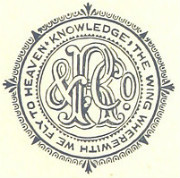
From the book Isabel St. Clair
Photo: The British Library
 inter alia
inter aliaPRONUNCIATION:
(IN-tuhr AY-lee-uh, AH-)
MEANING:
adverb: Among other things.
ETYMOLOGY:
From Latin inter (among) + alius (other). Earliest documented use: 1665.
USAGE:
“Gary Lineker is chatting to the second in line to the throne as his interviewee is, inter alia, president of the FA [The Football Association].”
Rachel Johnson; Now Try Calling Kate Your ‘Current Wife’, William...; Mail on Sunday (London, UK); May 31, 2015.
 athwart
athwartPRONUNCIATION:
(uh-THWART)
MEANING:
adverb, preposition: From side to side of; across; against.
ETYMOLOGY:
From a- (on, into, toward) + thwart, from Old Norse thvert, neuter of thverr (transverse). Earliest documented use: 1470.
USAGE:
“He shuffled athwart, keeping one eye ahead vigilantly.”
Joseph Conrad; Heart of Darkness; Blackwood’s Magazine; 1899.
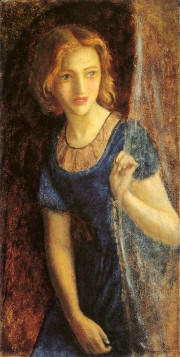
Ariana at the Window
Inspired by Tennyson’s poem, Mariana:
“She drew the casement-curtain by,
And glanced athwart the glooming flats.”
Art: Arthur Hughes (1832-1915)
 Jen ƸӜƷ wrote: "Ingle"
Jen ƸӜƷ wrote: "Ingle"I just had the best anniversary dinner this week at a restaurant called The Hearth.
resistentialism -
the malice of machines,
the inanimate.
the malice of machines,
the inanimate.
moue -
a pouting expression
conveying distaste.
a pouting expression
conveying distaste.
 Krampus
Krampus(noun)
In German-speaking Alpine folklore, Krampus is a horned, anthropomorphic figure who punishes children during the Christmas season who have misbehaved, in contrast with Saint Nicholas, who rewards well-behaved ones with gifts.
 debenture
debenturePRONUNCIATION:
(di-BEN-chuhr)
MEANING:
noun: A certificate acknowledging a debt.
ETYMOLOGY:
From Latin debentur (they are due/owing), the first word in early certificates of indebtedness. From Latin debere (to owe), ultimately from the Indo-European root ghabh- (to give or to receive), which is also the source of give, gift, able, habit, prohibit, due, duty, adhibit, and habile. Earliest documented use: 1455.
USAGE:
“‘My dear Violet,’ Allen said, leaning over to be heard, ‘you must recall that Foster’s idea of fun is curling up with a debenture agreement that includes an especially ingenious reordering of priorities in bankruptcy.’”
David O. Stewart; The Wilson Deception; Kensington Books; 2015.
 Jen ƸӜƷ wrote: "debenture
Jen ƸӜƷ wrote: "debenturePRONUNCIATION:
(di-BEN-chuhr)
MEANING:
noun: A certificate acknowledging a debt.
ETYMOLOGY:
From Latin debentur (they are due/owing), the first word in early certificates of indebtedn..."
That is so weird, Jen, we're dealing with the ramifications of a debenture.
Books mentioned in this topic
The Clicking of Cuthbert (other topics)The Crucible (other topics)
A History of Modern Drama, Volume I (other topics)
Toy Stories: Photos of Children from Around the World and Their Favorite Things (other topics)
The Book of Life (other topics)
More...
Authors mentioned in this topic
Leo Tolstoy (other topics)P.G. Wodehouse (other topics)
Leonardo da Vinci (other topics)
Theodore Roethke (other topics)
David Krasner (other topics)
More...




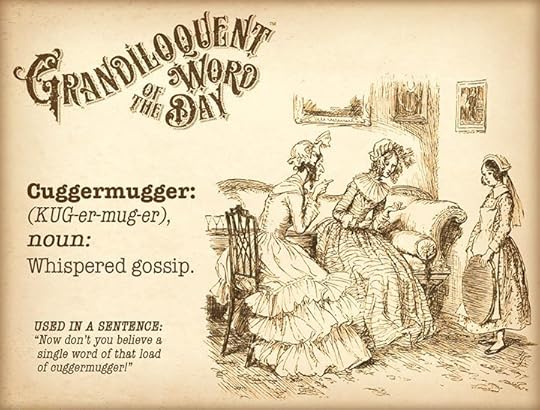

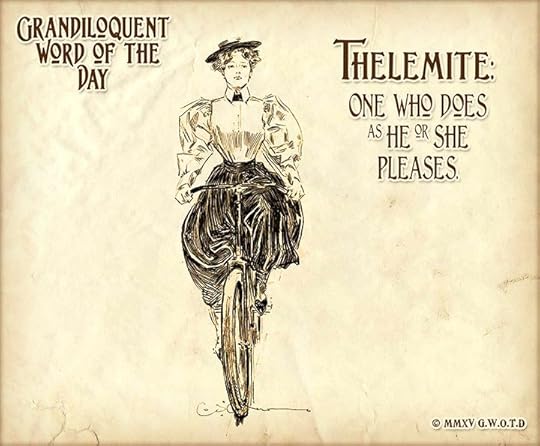
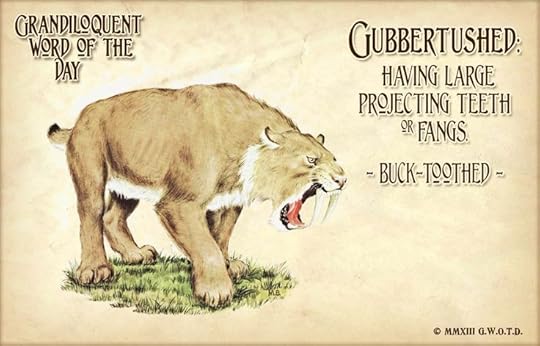
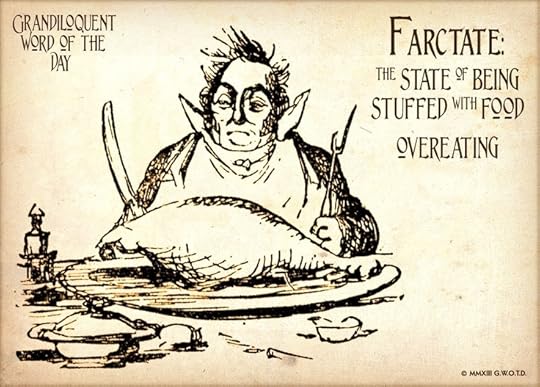


PRONUNCIATION:
(OS-kyuh-layt)
MEANING:
verb tr.: To kiss.
verb intr.: To touch or to bring together.
ETYMOLOGY:
From Latin osculatus, past participle of osculari (to kiss), from osculum (kiss; literally, little mouth), diminutive form of os (mouth). Ultimately from the Indo-European root os- (mouth), which also gave us usher, oral, orifice, oscillate, os, and ostiary. Earliest documented use: 1656.
USAGE:
“Angrat enjoyed the rest of their day in the swamp, as Beneficent grabbed one frog after another and eagerly osculated each amphibian on its little froggy nose.
As always, Angrat marveled at her sister’s eagerness to embrace any tall tale. Nothing came out of the smooches.”
D.E. Park; Unwashed Fiction; Lulu Press; 2015.
Cartoon: Joker magazine, Feb 1961, via retrothing.com